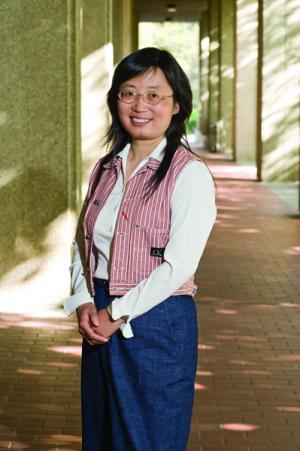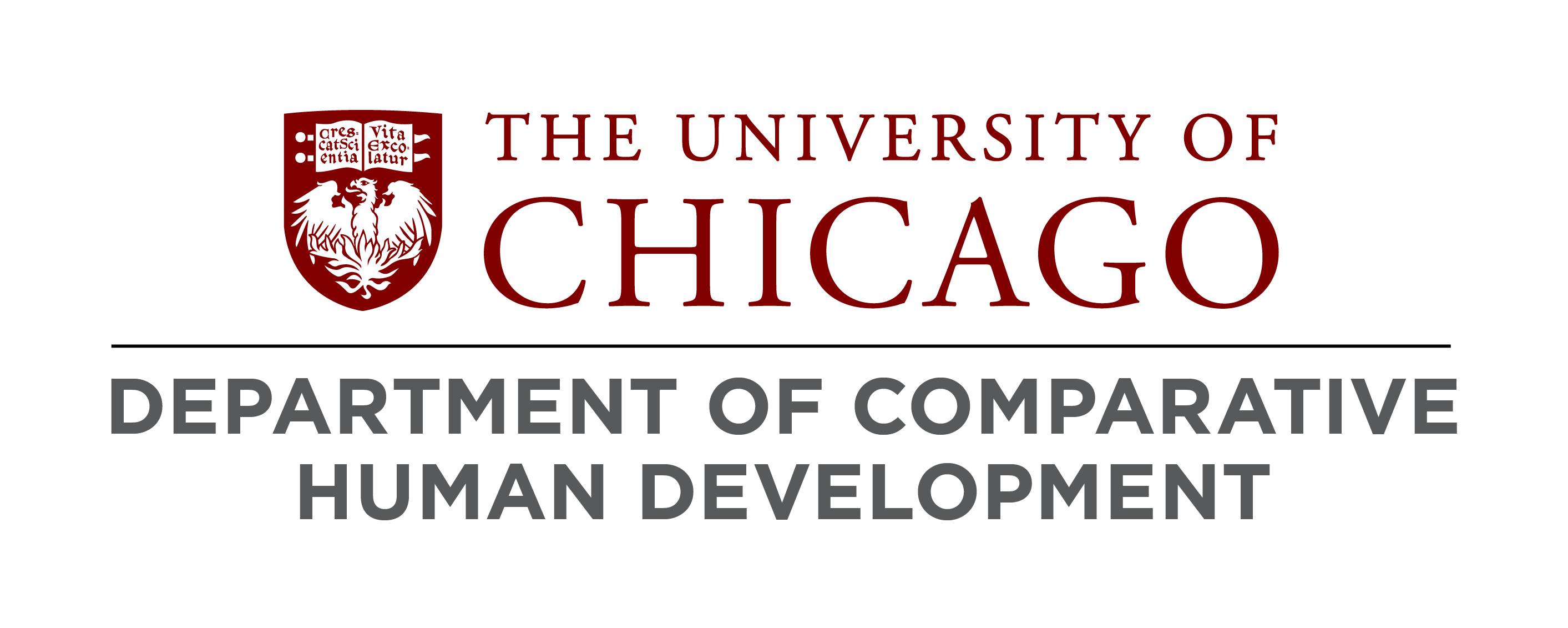
Guanglei Hong obtained a Master's degree in Applied Statistics and a Ph.D. in Education from the University of Michigan in 2004. She is the Inaugural Chair of the University-wide Committee on Quantitative Methods in Social, Behavioral, and Health Sciences (https://voices.uchicago.edu/qrmeth/) and Chair of the Committee on Education (https://voices.uchicago.edu/coed/) at the University of Chicago. Before joining the University of Chicago faculty in July 2009, she had been an Assistant Professor in the Human Development and Applied Psychology Department in the Ontario Institute for Studies in Education of the University of Toronto (OISE/UT).
Contact Information
Email: ghong@uchicago.edu
Personal website: http://voices.uchicago.edu/ghong/
Research
Prof. Hong has focused her research on developing causal inference theories and methods for evaluating educational and social policies and programs and for assessing the impacts of major contextual changes on child and youth development in multi-level, longitudinal settings. Her current research agenda is centered on causal moderation and mediation methodology. She has contributed original concepts and methods, developed analytic tools, and conducted important application studies that evaluate multivalued treatments, time-varying treatments, and mediation mechanisms in education and beyond. The RMPW method that she proposed in 2010 has drawn increased attention and has been regarded as a unifying framework for causal mediation analysis. Her monograph, “Causality in a social world: Moderation, mediation, and spill-over” published by Wiley in 2015, has received wide recognitions from colleagues. She guest edited the Journal of Research on Educational Effectiveness special issue on the statistical approaches to studying mediator effects in education research in 2012. Additionally, through publishing in first-tier statistics and education journals and disseminating the new methods through workshops and training sessions, her research has generated a broad impact among applied statisticians as well as applied researchers in the social, behavioral, and health sciences. She was recipient of a 2021-2022 John Simon Guggenheim Memorial Foundation Fellowship in education supporting her research into the role that inequality plays in shaping the impacts of the Great Recession on youth transition to adulthood.
Her research has received support from the National Science Foundation, the US Department of Education Institute of Education Sciences, the William T. Grant Foundation, the Spencer Foundation, the Social Sciences and Humanities Research Council of Canada, the National Academy of Education, and the American Educational Research Association Grants Program among other sources of funding. She is currently leading a 3-year institute in quantitative and computational methods for STEM education research (SIARM for STEM) sponsored by the National Science Foundation.
Teaching
Prof. Hong teaches quantitative methods courses including
CHDV 20101/30101 Applied Statistics in Human Development Research
CHDV 30102 Introduction to Causal Inference
CHDV 32411 Mediation, Moderation, and Spillover Effects
CHDV 40102 Advanced Topics in Causal Inference
In addition, she has taught courses in the College including
SOSC 13200 Social Science Inquiry
CHDV 20100 Human Development Research Designs.
In Spring 2020, she led a class of 73 college students and five teaching assistants in a study entitled “Coping with COVID-19: Safety Nets in a Perfect Storm.” The survey and interview data generated from this study, along with research reports prepared by a team of students during summer 2020, have been made publicly available online for research and instructional use.
Publications (selective)
Book
Hong, G. (2015). Causality in a social world: Moderation, mediation, and spill-over. West Sussex, UK: Wiley-Blackwell.
Edited Volume
Hong, G. (2012). Journal of Research on Educational Effectiveness, special issue on the statistical approaches to studying mediator effects in education research. (Guest Editor)
Articles
Hong, G., & Chung, H.-J. (online first). Assessing the impact of the Great Recession on the transition to adulthood. Sociological Methods & Research. https://doi.org/10.1177/00491241221113871
Hong, G.*, Yang, F.*, & Qin, X. (online first). Posttreatment confounding in causal mediation studies: A cutting-edge problem and a novel solution via sensitivity analysis. Biometrics. (* equal first-authors) http://doi.org/10.1111/biom.13705
Hong, Y., & Hong, G. (2021). Schools with test-based promotion: Effects on instructional time alloction and student learning in third grade. AERA Open, 7(1), 1-15.
Hong, G., Yang, F., & Qin, X. (2021). Did you conduct a sensitivity analysis? A new weighting-based approach for evaluations of the average treatment effect for the treated. Journal of the Royal Statistical Society, Series A: Statistics in Society, 184(1), 227-254.
Qin, X., Deutsch, J., Hong, G. (2021). Revealing heterogeneity in complex mediation mechanisms: Two concurrent mediators. Journal of Policy Analysis and Management, 40(1), 158-190.
Qin, X., Hong, G., Deutsch, J., & Bein, E. (2019). Multisite causal mediation analysis in the presence of complex sample and survey designs and non-random nonresponse. Journal of the Royal Statistical Society, Series A: Statistics in Society, Vol. 182, Part 4, 1343-1370.
Hong, G., Qin, X., & Yang, F. (2018). Weighting-based sensitivity analysis in causal mediation studies. Journal of Educational and Behavioral Statistics, 43(1), 32-56.
Bein, E., Deutsch, J., Hong, G., Porter, K., Qin, X., & Yang, C. (2018). Two-step estimation in RMPW analysis. Statistics in Medicine, 37(8), 1304-1324.
Qin, X., & Hong, G. (2017). A weighting method for assessing between-site heterogeneity in causal mediation mechanism. Journal of Educational and Behavioral Statistics, 42(3), 308-340.
Garrett, R., & Hong, G. (2016). Impacts of grouping and time on the math learning of language minority kindergartners. Educational Evaluation and Policy Analysis, 38(2), 222-244.
Hong, G., Deutsch, J., & Hill, H. D. (2015). Ratio-of-mediator-probability weighting for causal mediation analysis in the presence of treatment-by-mediator interaction. Journal of Educational and Behavioral Statistics 40(3), 307-340.
VanderWeele, T., Hong, G., Jones, S., & Brown, J. (2013). Mediation and spillover effects in group-randomized trials: A case study of the 4R’s educational intervention. Journal of the American Statistical Association, 108(502), 469-482.
Hong, G., Raudenbush, S. W. (2013). Heterogeneous agents, social interactions, and causal inference. In the Handbook of Causal Analysis for Social Research (pp.331-352) edited by Stephen L. Morgan. NY: Springer.
Hong, G. (2013). Covariate-informed parallel design: Discussion of “experimental designs for identifying causal mechanisms” by Imai, Tingley, and Yamamoto. Journal of the Royal Statistical Society, Serial A, 176, 35.
Hong, G., & Nomi, T. (2012). Weighting methods for assessing policy effects mediated by peer change. Journal of Research on Educational Effectiveness special issue on the statistical approaches to studying mediator effects in education research, 5(3), 261-289.
Hong, G., & Nomi, T. (2012). Rejoinder. Journal of Research on Educational Effectiveness special issue on the statistical approaches to studying mediator effects in education research, 5(3), 299-302.
Hong, G. (2012). Editorial comments. Journal of Research on Educational Effectiveness special issue on the statistical approaches to studying mediator effects in education research, 5(3), 213-214.
Hong, G. (2012). Marginal mean weighting through stratification: A generalized method for evaluating multi-valued and multiple treatments with non-experimental data. Psychological Methods, 17(1), 44-60.
Hong, G., Corter, C., Hong, Y., & Pelletier, J. (2012). Differential effects of literacy instruction time and homogeneous grouping in kindergarten: Who will benefit? Who will suffer? Educational Evaluation and Policy Analysis, 34(1), 69-88.
Hong, G., Nomi, T., & Yu, B. (2012). Prognostic score-based difference-in-differences. In JSM Proceedings, Social Statistics Section. Alexandria, VA: American Statistical Association, 4952-4966.
Hong, G., Deutsch, J., & Hill, H. (2011). Parametric and non-parametric weighting methods for estimating mediation effects: An application to the National Evaluation of Welfare-to-Work Strategies. In JSM Proceedings, Social Statistics Section. Alexandria, VA: American Statistical Association, 3215-3229.
Hong, G. (2010). Marginal mean weighting through stratification: Adjustment for selection bias in multilevel data. Journal of Educational and Behavioral Statistics, 35(5), 499-531.
Chen-Bumgardner, X., Xu, F., Kim, N., Hong, G., Wang, Y. (2010). Effects of cross-language transfer on first language phonological awareness and literacy skills in Chinese children receiving English instruction. Journal of Educational Psychology, 102(3), 712-728.
Hong, G. (2010). Ratio of mediator probability weighting for estimating natural direct and indirect effects. In JSM Proceedings, Biometrics Section, Alexandria, VA: American Statistical Association. 2401-2415.
Hong, G., & Hong, Y. (2009). Reading instruction time and homogeneous grouping in kindergarten: An application of marginal mean weighting through stratification. Educational Evaluation and Policy Analysis, 31(1), 54-81.
Hong, G., & Raudenbush, S. W. (2008) Causal inference for time-varying instructional treatments. Journal of Educational and Behavioral Statistics, 33(3), 333-362.
Hong, G., & Yu, B. (2008). Effects of kindergarten retention on children’s social-emotional development: An application of propensity score method to multivariate multi-level data. Special Section on New Methods in Developmental Psychology, 44(2), 407-421.
Hong, G., & Yu, B. (2007). Early grade retention and children’s reading and math learning in elementary years. Educational Evaluation and Policy Analysis, 29(4), 239-261.
Hong, G., & Raudenbush, S. W. (2006). Evaluating kindergarten retention policy: A case study of causal inference for multi-level observational data. Journal of the American Statistical Association, 101(475), 901-910.
Hong, G., & Raudenbush, S. W. (2005). Effects of kindergarten retention policy on children's cognitive growth in reading and mathematics. Educational Evaluation and Policy Analysis, 27(3), 205-224.
Hong, G., & Raudenbush, S. W. (2003). “Causal inference for multi-level observational data with application to kindergarten retention study." In JSM 2003 Proceedings, Social Statistics Section, Alexandria, VA: American Statistical Association. 1849-1856
Awards
John Simon Guggenheim Memorial Foundation Fellowship, John Simon Guggenheim Memorial Foundation, 2021-2022
William T. Grant Scholar, William T. Grant Foundation, 2009-2014
NAE/Spencer Postdoctoral Fellowship, National Academy of Education and Spencer Foundation, 2006-2007
AERA Mary Catherine Ellwein Outstanding Dissertation Award – Measurement and Quantitative Research Methodology, American Educational Research Association, Division D, 2005
Spencer Dissertation Fellowship for Research Related to Education, Spencer Foundation, 2003-2004
Joint Statistical Meetings Student Paper Competition Award, American Statistical Association, 2003
AERA Dissertation Grant, American Educational Research Association, 2002-2003
Recent Research Grants
Principal Investigator, “Causal Moderation and Mediation Analyses in Single-Site and Multisite Randomized Trials with Noncompliance,” the Institute of Education Sciences (IES) Statistical and Research Methodology in Education Grants. USD 899,920, 2020-2023.
Principal Investigator, “Methods for Investigating Causal Mechanisms in Multi-Site Experimental and Quasi-Experimental Studies,” the National Science Foundation (NSF) Methodology, Measurement, and Statistics Program, USD 410,000, 2017-2021.
Co-Principal Investigator, “Drawing Connections to Close Achievement Gaps in Mathematics,” the Institute of Education Sciences (IES) Education Research Program, USD 1,398,230, 2017-2021. (Princpal Investigator: Lindsey Richland, University of California-Irvine)
Co-Investigator, “Using Emerging Methods with Existing Data from Multi-site Trials to Learn About and From Variation in Educational Program Effects,” Spencer Foundation, subcontract to the University of Chicago: USD 126,185, 2014-2017. (Principal Investigator: Howard Bloom, MDRC) (Note: Due to conflict of interest, my participation in this project was not supported by funding from the Spencer Foundation.)
Principal Investigator, “Weighting Methods for Mediation Analysis in Experimental and Quasi-Experimental Multilevel Data,” the Institute of Education Sciences (IES) Statistical and Research Methodology in Education Grants, USD 850,000, 2012-2015.
Training Grant
Co-Principal Investigator, “Collaborative Research: Cutting-Edge Quantitative and Computational Methods for STEM Education Research,” the National Science Foundation ECR: BCSER. (Collaborator: Michigan State University; Co-Principal Investigator: Ken Frank.) USD 999,828, 2020-2023.
 THE UNIVERSITY OF CHICAGO
THE UNIVERSITY OF CHICAGO

